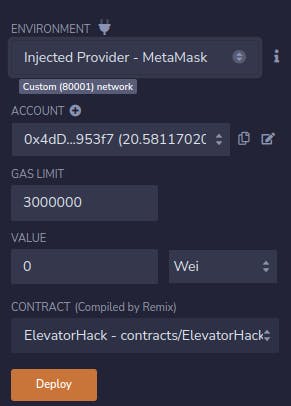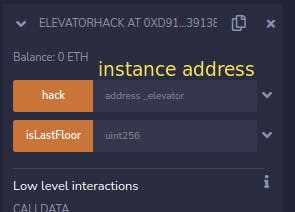The Ethernaut-Solutions repository contains the solutions using Foundry and Hardhat.
Objectives
- This level requires you to take the elevator to the top floor. Set the
toptotrue.
Analysis
Let's take a look at the level contract,
interface Building {
function isLastFloor(uint) external returns (bool);
}
contract Elevator {
bool public top;
uint public floor;
function goTo(uint _floor) public {
Building building = Building(msg.sender);
if (! building.isLastFloor(_floor)) {
floor = _floor;
top = building.isLastFloor(floor);
}
}
}
We need to set the top to true to clear the level. top will set to true if building.isLastFloor(floor) returns true. The Building interface is instantiated with msg.sender address; this implies that msg.sender should implement the Building interface. Note that, Elevator contract does not implement the Building interface. We will create a contract called ElevatorHack that will implement the Building interface and call the goTo() function on the Elevator contract so that inside the goTo() function, msg.sender will be the ElevatorHack contract; doing so, our version of isLastFloor() will be executed.
isLastFloor() is called twice in the goTo() function. To get past the if condition, isLastFloor() should return false, so that !false becomes true. To set the top to true , isLastFloor() should return true.
Exploit
Let’s create a contract that will hack the level.
Go to the Remix IDE and create the following contract.
Elevator contract implements the isLastFloor() function of the Building interface, which the level contract will call. We will execute the hack() function, which calls thegoTo() function of the level contract. The goTo() function then calls the above contract’s isLastFloor() function. This gives us complete control over the return values from the function. As mentioned earlier, we need to return false in the first execution to pass if condition and true in the second execution to set top to true.
We have declared the state variable count, initialized to 0 by default. When the function isLastFloor() is called for the first time, (count > 0) returns false, and executes the else block. count++ sets count to 1, and the function returns false, which passes the if condition. The goTo() function will call the isLastFloor() function again for setting the top. Since count > 0, isLastFloor() returns true and sets the top to true.
Make sure
Metamaskis connected to thetestnet. SelectInjected Provider. Deploy theElevatorHackcontract.
Call
hack()function, passinginstance addressas an argument.
Check value of
top. This will returntrue.await contract.top();
Submit the instance.
Level passed!!!😄
Key Takeaways
Exercise caution when inheriting from contracts that implement interfaces, as this can introduce additional layers of abstraction, which may make it more difficult to understand and predict the behavior of your contract. This can increase the risk of potential security vulnerabilities, as it may be more difficult to identify and address potential issues.
Be cautious when interacting with external contracts that implement an interface that your contract uses.
It is generally a good practice to limit the ability of other users to modify the storage and state of your contract. One way to do this is to use access controls, such as the
msg.sendervalue, to limit which users are able to call certain functions or modify certain variables in your contract. However, it may be necessary to allow some users to implement their own interfaces or to modify the storage and state of your contract in certain circumstances. If you do need to allow this, you should ensure that you have thoroughly considered the security implications and have implemented appropriate safeguards.
The Ethernaut-Solutions repository contains the solutions using Foundry and Hardhat.
Solution using Foundry:-
Solution using Hardhat:-
More Levels
![Ethernaut Level 11 Elevator [Foundry-Hardhat]](https://cdn.hashnode.com/res/hashnode/image/upload/v1672920784200/ba3b6768-632e-40da-adce-42a11cde12dc.png?w=1600&h=840&fit=crop&crop=entropy&auto=compress,format&format=webp)